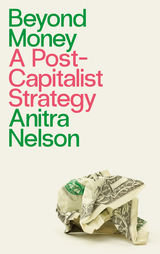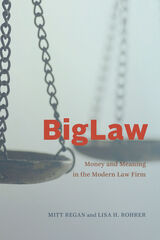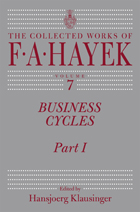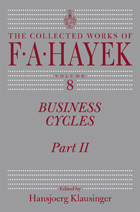112 books about Money and 6
start with B
112 books about Money and 6
112 books about Money
6 start with B start with B
6 start with B start with B

Barons
Money, Power, and the Corruption of America's Food Industry
Austin Frerick
Island Press, 2024
“In this eye-opening debut study, Frerick, an agricultural policy fellow at Yale University, reveals the ill-gained stranglehold that a handful of companies have on America’s food economy…It’s a disquieting critique of private monopolization of public necessities.” --Publishers Weekly, starred
Barons is the story of seven corporate titans, their rise to power, and the consequences for everyone else. Take Mike McCloskey, Chairman of Fair Oaks Farms. In a few short decades, he went from managing a modest dairy herd to running the Disneyland of agriculture, where school children ride trams through mechanized warehouses filled with tens of thousands of cows that never see the light of day. What was the key to his success? Hard work and exceptional business savvy? Maybe. But more than anything else, Mike benefitted from deregulation of the American food industry, a phenomenon that has consolidated wealth in the hands of select tycoons, and along the way, hollowed out the nation’s rural towns and local businesses.
Along with Mike McCloskey, readers will meet a secretive German family that took over the global coffee industry in less than a decade, relying on wealth traced back to the Nazis to gobble up countless independent roasters. They will discover how a small grain business transformed itself into an empire bigger than Koch Industries, with ample help from taxpayer dollars. And they will learn that in the food business, crime really does pay—especially when you can bribe and then double-cross the president of Brazil.
These, and the other stories in this book, are simply examples of the monopolies and ubiquitous corruption that today define American food. The tycoons profiled in these pages are hardly unique: many other companies have manipulated our lax laws and failed policies for their own benefit, to the detriment of our neighborhoods, livelihoods, and our democracy itself. Barons paints a stark portrait of the consequences of corporate consolidation, but it also shows we can choose a different path. A fair, healthy, and prosperous food industry is possible—if we take back power from the barons who have robbed us of it.
Barons is the story of seven corporate titans, their rise to power, and the consequences for everyone else. Take Mike McCloskey, Chairman of Fair Oaks Farms. In a few short decades, he went from managing a modest dairy herd to running the Disneyland of agriculture, where school children ride trams through mechanized warehouses filled with tens of thousands of cows that never see the light of day. What was the key to his success? Hard work and exceptional business savvy? Maybe. But more than anything else, Mike benefitted from deregulation of the American food industry, a phenomenon that has consolidated wealth in the hands of select tycoons, and along the way, hollowed out the nation’s rural towns and local businesses.
Along with Mike McCloskey, readers will meet a secretive German family that took over the global coffee industry in less than a decade, relying on wealth traced back to the Nazis to gobble up countless independent roasters. They will discover how a small grain business transformed itself into an empire bigger than Koch Industries, with ample help from taxpayer dollars. And they will learn that in the food business, crime really does pay—especially when you can bribe and then double-cross the president of Brazil.
These, and the other stories in this book, are simply examples of the monopolies and ubiquitous corruption that today define American food. The tycoons profiled in these pages are hardly unique: many other companies have manipulated our lax laws and failed policies for their own benefit, to the detriment of our neighborhoods, livelihoods, and our democracy itself. Barons paints a stark portrait of the consequences of corporate consolidation, but it also shows we can choose a different path. A fair, healthy, and prosperous food industry is possible—if we take back power from the barons who have robbed us of it.
[more]

Beyond Money
A Postcapitalist Strategy
Anitra Nelson
Pluto Press, 2022
'A fascinating portal into arguments about why we need to get beyond money' - Harry Cleaver
What would a world without money look like? This book is a lively thought experiment that deepens our understanding of how money is the driver of political power, environmental destruction and social inequality today, arguing that it has to be abolished rather than repurposed to achieve a postcapitalist future.
Grounded in historical debates about money, Anitra Nelson draws on a spectrum of political and economic thought and activism, including feminism, ecoanarchism, degrowth, permaculture, autonomism, Marxism and ecosocialism. Looking to Indigenous rights activism and the defense of commons, an international network of activists engaged in a fight for a money-free society emerges.
Beyond Money shows that, by organizing around post-money versions of the future, activists have a hope of creating a world that embodies their radical values and visions.
What would a world without money look like? This book is a lively thought experiment that deepens our understanding of how money is the driver of political power, environmental destruction and social inequality today, arguing that it has to be abolished rather than repurposed to achieve a postcapitalist future.
Grounded in historical debates about money, Anitra Nelson draws on a spectrum of political and economic thought and activism, including feminism, ecoanarchism, degrowth, permaculture, autonomism, Marxism and ecosocialism. Looking to Indigenous rights activism and the defense of commons, an international network of activists engaged in a fight for a money-free society emerges.
Beyond Money shows that, by organizing around post-money versions of the future, activists have a hope of creating a world that embodies their radical values and visions.
[more]

BigLaw
Money and Meaning in the Modern Law Firm
Mitt Regan and Lisa H. Rohrer
University of Chicago Press, 2021
The Great Recession intensified large law firms’ emphasis on financial performance, leading to claims that lawyers in these firms were now guided by business rather than professional values. Based on interviews with more than 250 partners in large firms, Mitt Regan and Lisa H. Rohrer suggest that the reality is much more complex. It is true that large firm hiring, promotion, compensation, and termination policies are more influenced by business considerations than ever before and that firms actively recruit profitable partners from other firms to replace those they regard as unproductive. At the same time, law firm partners continue to seek the non-financial rewards of being members of a distinct profession and are sensitive to whether their firms are committed to providing them. Regan and Rohrer argue that modern firms responding effectively to business demands while credibly affirming the importance of non-financial professional values can create strong cultures that enhance their ability to weather the storms of the modern legal market.
[more]

Bread, Wine, and Money
The Windows of the Trades at Chartres Cathedral
Jane Welch Williams
University of Chicago Press, 1993
At Chartres Cathedral, for the first time in medieval art, the lowest register of stained-glass windows depicts working artisans and merchants instead of noble and clerical donors. Jane Welch Williams challenges the prevailing view that pious town tradesmen donated these windows. In Bread, Wine, and Money, she uncovers a deep antagonism between the trades and the cathedral clergy in Chartres; the windows, she argues, portray not town tradesmen but trusted individuals that the fearful clergy had taken into the cloister as their own serfs.
Williams weaves a tight net of historical circumstances, iconographic traditions, exegetical implications, political motivations, and liturgical functions to explain the imagery in the windows of the trades. Her account of changing social relationships in thirteenth-century Chartres focuses on the bakers, tavern keepers, and money changers whose bread, wine, and money were used as means of exchange, tithing, and offering throughout medieval society. Drawing on a wide variety of original documents and scholarly work, this book makes important new contributions to our knowledge of one of the great monuments of Western culture.
Williams weaves a tight net of historical circumstances, iconographic traditions, exegetical implications, political motivations, and liturgical functions to explain the imagery in the windows of the trades. Her account of changing social relationships in thirteenth-century Chartres focuses on the bakers, tavern keepers, and money changers whose bread, wine, and money were used as means of exchange, tithing, and offering throughout medieval society. Drawing on a wide variety of original documents and scholarly work, this book makes important new contributions to our knowledge of one of the great monuments of Western culture.
[more]

Business Cycles
Part I
F. A. Hayek
University of Chicago Press, 2012
In the years following its publication, F. A. Hayek’s pioneering work on business cycles was regarded as an important challenge to what was later known as Keynesian macroeconomics. Today, as debates rage on over the monetary origins of the current economic and financial crisis, economists are once again paying heed to Hayek’s thoughts on the repercussions of excessive central bank interventions.
The latest editions in the University of Chicago Press’s ongoing series The Collected Works of F. A. Hayek, these volumes bring together Hayek’s work on what causes periods of boom and bust in the economy. Moving away from the classical emphasis on equilibrium, Hayek demonstrates that business cycles are generated by the adaptation of the structure of production to changes in relative demand. Thus, when central banks artificially lower interest rates, the result is a misallocation of capital and the creation of asset bubbles and additional instability. Business Cycles, Part I contains Hayek’s two major monographs on the topic: Monetary Theory and the Trade Cycle and Prices and Production. Reproducing the text of the original 1933 translation of the former, this edition also draws on the original German, as well as more recent translations. For Prices and Production, a variorum edition is presented, incorporating the 1931 first edition and its 1935 revision. Business Cycles, Part II assembles a series of Hayek’s shorter papers on the topic, ranging from the 1920s to 1981.
In addition to bringing together Hayek’s work on the evolution of business cycles, the two volumes of Business Cycles also include extensive introductions by Hansjoerg Klausinger, placing the writings in intellectual context—including their reception and the theoretical debates to which they contributed—and providing background on the evolution of Hayek’s thought.
[more]

Business Cycles
Part II
F. A. Hayek
University of Chicago Press, 2012
In the years following its publication, F. A. Hayek’s pioneering work on business cycles was regarded as an important challenge to what was later known as Keynesian macroeconomics. Today, as debates rage on over the monetary origins of the current economic and financial crisis, economists are once again paying heed to Hayek’s thoughts on the repercussions of excessive central bank interventions.
The latest editions in the University of Chicago Press’s ongoing series The Collected Works of F. A. Hayek, these volumes bring together Hayek’s work on what causes periods of boom and bust in the economy. Moving away from the classical emphasis on equilibrium, Hayek demonstrates that business cycles are generated by the adaptation of the structure of production to changes in relative demand. Thus, when central banks artificially lower interest rates, the result is a misallocation of capital and the creation of asset bubbles and additional instability. Business Cycles, Part I contains Hayek’s two major monographs on the topic: Monetary Theory and the Trade Cycle and Prices and Production. Reproducing the text of the original 1933 translation of the former, this edition also draws on the original German, as well as more recent translations. For Prices and Production, a variorum edition is presented, incorporating the 1931 first edition and its 1935 revision. Business Cycles, Part II assembles a series of Hayek’s shorter papers on the topic, ranging from the 1920s to 1981.
In addition to bringing together Hayek’s work on the evolution of business cycles, the two volumes of Business Cycles also include extensive introductions by Hansjoerg Klausinger, placing the writings in intellectual context—including their reception and the theoretical debates to which they contributed—and providing background on the evolution of Hayek’s thought.
[more]
READERS
Browse our collection.
PUBLISHERS
See BiblioVault's publisher services.
STUDENT SERVICES
Files for college accessibility offices.
UChicago Accessibility Resources
home | accessibility | search | about | contact us
BiblioVault ® 2001 - 2024
The University of Chicago Press









